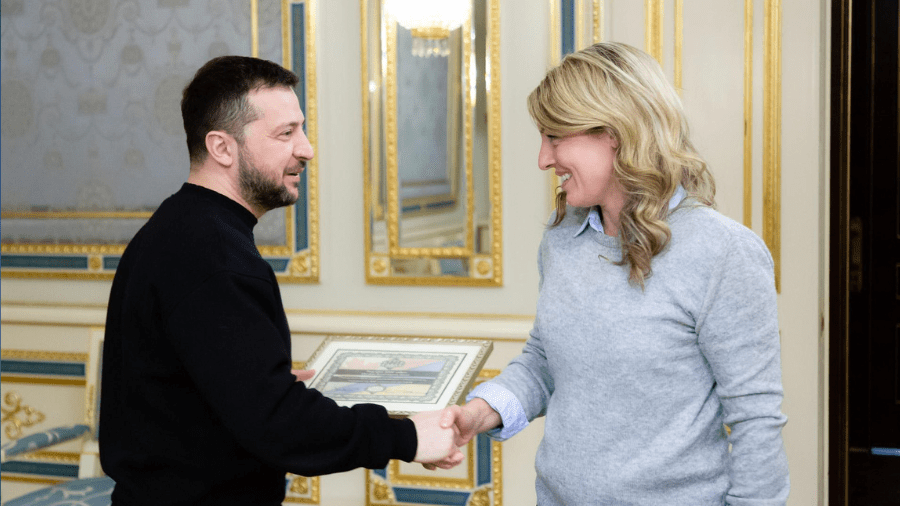This article originally appeared in the Toronto Sun.
By Sarah Teich & Maria Reisdorf, February 24, 2023
Friday marks the sombre one-year anniversary of Russia’s full-scale invasion of Ukraine. One year ago, Russian forces invaded Ukraine and began an unprovoked, aggressive war to conquer its territory.
Over the last year, substantial evidence has been collected of numerous war crimes and crimes against humanity committed by Russian forces in Ukraine. Extrajudicial killings have been documented across the country as Russian troops engage in mass killings of civilians; sexual and gender-based violence has been used as a weapon of war; and leading experts and politicians have cautioned that there exists a serious risk of genocide.
From providing supplies, funding, training, and moral support, to accepting more than 150,000 Ukrainian refugees, Canada responded swiftly to Russia’s aggression. Just last week, Minister of Foreign Affairs Melanie Joly travelled to Kyiv, meeting with Ukrainian President Volodymyr Zelenskyy and his wife, Olena Zelenska, to deliver a message of reassurance that Canada will remain a “steadfast supporter” of Ukraine.
The war hits home for Canada’s near one million ethnic Ukrainians. It is widely believed that there will be significantly more devastation before this war ends. It is, unfortunately, far from over. For those of us with relatives in Ukraine, Friday is particularly terrifying as the one-year anniversary brings fear of more carnage to those aware of Russia’s tactics, including their obsession with symbolic dates.
On Wednesday, Joly delivered remarks to the UN General Assembly, stating that “there’s no option but victory for Ukraine. Canada will be there to support Ukraine’s fight for freedom, for as long as it takes.”
Ukraine’s victory depends on international support. While Canadian support so far remains steadfast, the tides are slowly turning in the United States. On Monday, U.S. President Joe Biden travelled to Kyiv, stating that he was reaffirming their “unwavering and unflagging commitment to Ukraine’s democracy, sovereignty, and territorial integrity.” Yet not all Americans stand by his statement.
For example, Rep. Marjorie Taylor Greene, who tweeted that Biden’s trip was “incredibly insulting,” has previously stated that “under Republicans, not another penny will go to Ukraine,” despite the fact that many Republicans do stand by Ukraine. Earlier this month, Republican Congressman Matt Gaetz introduced the “Ukraine Fatigue” Resolution, calling for an end to all U.S. military, financial and humanitarian aid to Ukraine. Supporters of the bill oppose providing assistance to Ukraine, and say the best way to end the war is to force Ukraine to cede territory to Russia.
This is incredibly insulting.
Today on our President’s Day, Joe Biden, the President of the United States chose Ukraine over America, while forcing the American people to pay for Ukraine’s government and war.
I can not express how much Americans hate Joe Biden. pic.twitter.com/nHXzG67YOL
— Rep. Marjorie Taylor Greene🇺🇸 (@RepMTG) February 20, 2023
However, ending aid to Ukraine would not end the war. In fact, it would play directly into Russia’s hands. A Ukrainian victory will not be possible without the continued support of rights-respecting countries like Canada and the United States. Continued support may protract the conflict, but the alternative is a full-scale loss. Russia would win the war against Ukraine, authoritarianism would win over democracy, and dictators around the world would learn that they can commit mass atrocities and violate human rights, with impunity, so long as they keep at it long enough that they win.
This would spell disaster not just for Ukraine but for all democratic countries around the world, including ours.
This is why our continued support of Ukraine matters, and why Canada must not allow war fatigue to creep in. As Russia’s unprovoked attack on Ukraine drags on, we risk becoming desensitized to the devastating effects of war. But helping Ukraine provides significant strategic benefits, including exposing Russia’s weaknesses. It punishes Russia for its flagrant human rights abuses, and deters other regimes, such as China, from engaging in similar acts. It is also the ethical thing to do.
Letting war fatigue win is letting Russia win. One year on, this fatigue must be overcome.
Sarah Teich is an international human rights lawyer and a senior fellow at the Macdonald-Laurier Institute and Maria Reisdorf is an international human rights lawyer and a proud Ukrainian-Canadian.





